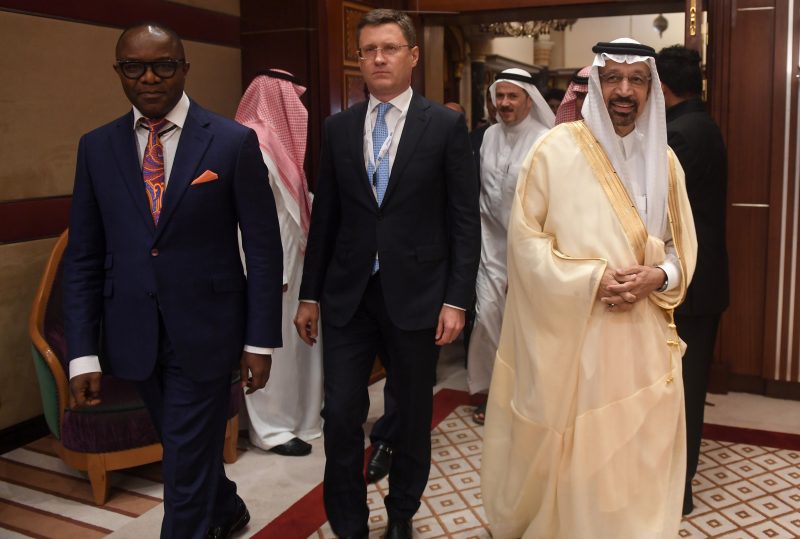Saudi, UAE see sufficient oil supplies, rising stocks
Nigerian Energy Minister Emmanuel Ibe Kachikw, Russian Energy Minister Alexander Novak, and Saudi Arabian Energy Minister Khalid al-Falih arrive at the one-day OPEC+ group meeting in the Saudi city of Jeddah on Sunday (Amer HILABI)
Jeddah (Saudi Arabia) (AFP) – Oil supplies were sufficient and stockpiles were still rising despite massive output drops from Iran and Venezuela, said OPEC kingpin Saudi Arabia and key producer UAE on Sunday, as oil exporters met in Jeddah.
Producer nations gathered to discuss how to stabilise a volatile oil market amid rising US-Iran tensions in the Gulf, which threaten to disrupt global supply.
But “we see that (oil) inventories are rising and supplies are plenty,” Saudi Energy Minister Khalid al-Falih told reporters at the start the meeting.
“None of us wants to see the (oil) stocks swell again,” he added, with reference to a supply surplus that sent prices sharply lower in the second half of last year.
“We have to be cautious,” Falih said.
The UAE’s energy minister said there was no need to relax a deal by the OPEC+ group of oil exporting countries to cut output by 1.2 million barrels per day to support prices.
“We have seen inventory building. I don’t think it makes sense” to alter the existing deal, said Suheil al-Mazrouei.
The meeting comes days after sabotage attacks against tankers in highly sensitive Gulf waters and the bombing of a Saudi pipeline — the latter claimed by Iran-aligned Yemeni rebels.
But Falih reiterated Sunday that the kingdom’s oil installations were well protected.
“We have strong (oil) industry security”, he told reporters.
“Everybody is vulnerable to extreme acts of sabotage.”
The meeting also comes as the full impact of re-instated US sanctions against Tehran kick in, slashing the Islamic republic’s crude exports.
– Iran exports tumble –
But Iran — which did not send a representative to the meeting — was still expected to dominate the one-day meeting of the OPEC+ group of oil producing nations.
The meeting is set to conclude by making recommendations for a key summit of oil producers in late June, to be attended by Iran.
Russian Energy Minister Alexander Novak said it was “premature” to talk about extending the deal, according to Interfax news agency.
Massive drops in exports by Iran and Venezuela come alongside output cuts of 1.2 million barrels per day implemented by the OPEC+ group since January.
The International Energy Agency said earlier this month that global oil supply fell in April due to the effect of US sanctions on Iran and the OPEC+ production cuts.
The IEA said Iranian crude production fell in April to 2.6 million bpd, down from 3.9ay 2018 it would withdraw from the multilateral 2015 Iran nuclear deal and re-impose sanctions.
Iran’s output is already at its lowest level in over five years, but could tumble in May to levels not seen since the devastating 1980-1988 Iran-Iraq war.
Energy intelligence firm Kpler sees Iranian exports plunging from 1.4 million bpd in April to around half a million bpd in May — down from 2.5 million in normal circumstances.
Venezuela’s output — also subject to US export sanctions — is also tumbling, down by over half since the third quarter of last year.
Kpler data shows OPEC+ members have kept to agreed production cuts.
But exporters fear a rush to raise production to plug the gap left by Iranian exports could backfire, triggering a new supply glut.
– Gulf tensions –
Sunday’s meeting comes amid soaring Gulf tensions after the mysterious sabotage of several tankers off the Emirati coast and drone attacks claimed by Yemen’s Huthi rebels, which shut a key Saudi crude pipeline.
Both attacks targeted routes built as alternatives to the Strait of Hormuz, the conduit for almost all Gulf exports.
Iran has repeatedly threatened to close the Strait in case of war with the US, which said this month it was sending an aircraft carrier and strike group to the region.
Saudi Arabia accused Iran — which backs Yemen’s Huthi rebels — of ordering the pipeline attacks, targeting “the security of oil supplies… and the global economy”.
Saudi foreign affairs minister Adel al-Jubeir said Sunday his country does not want war with Iran, but was ready to defend its interests.
Riyadh “does not want a war, is not looking for it and will do everything to prevent it”, he told journalists in Riyadh.
Saudi Arabia called Saturday for urgent meetings of the Gulf Cooperation Council and the Arab League to discuss escalating tensions, government news agency SPA said.
It also said Crown Prince Mohammed bin Salman had spoken with US Secretary of State Mike Pompeo about enhancing security in the region.
Falih had said last month the kingdom was ready to boost supplies in case of any shortage caused by the Iran embargo.
Iranian Oil Minister Bijan Namdar Zanganeh has said Washington’s stated aim of bringing Iran’s oil exports “to zero” amounts to “an illusion”.
Disclaimer: Validity of the above story is for 7 Days from original date of publishing. Source: AFP.


